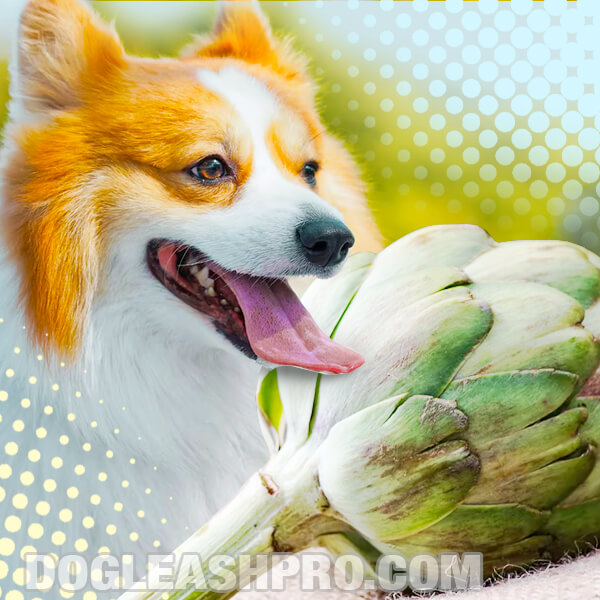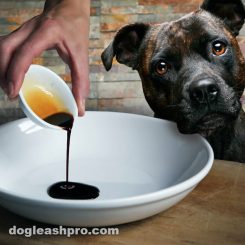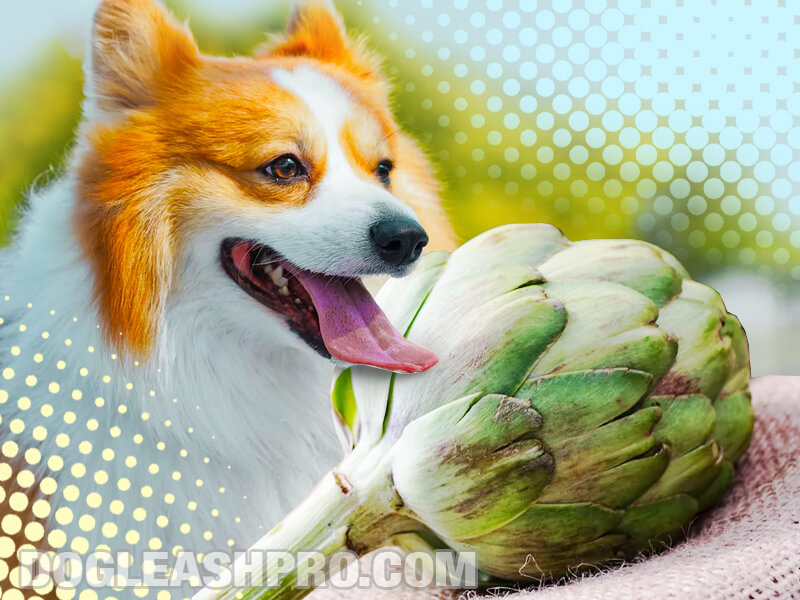
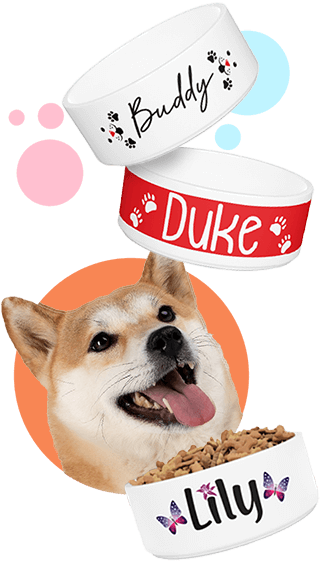
Is your dog looking at you with his puppy eyes while you’re enjoying some Artichokes? If you’re thinking about sharing this delicious vegetable with your furry pals, you may wonder, “Can my dog eat Artichokes?” In this article, we’ll discuss everything you need to know about dogs and Artichokes, including how to properly prepare this veggie before feeding it to your dogs and what to look out for. For now, here’s the short answer.
Can dogs eat Artichokes? Yes, dogs can eat Artichokes in moderation as long as the Artichokes are plain and don’t contain any added seasonings like garlic, salt, vinegar, or spices. Avoid feeding your dog Artichokes that have been marinated in oil, distilled vinegar, citric acid, and spices as this could cause digestive issues in dogs, including diarrhea and flatulence.
The good news is that with proper preparation, Artichokes can offer many health benefits to your canine friends. Here, we’ll share tips and tricks on how to properly prepare this heart-healthy vegetable so that your pooch can enjoy it as much as you do. Let’s begin!
Table of Contents
Can dogs have Artichokes?
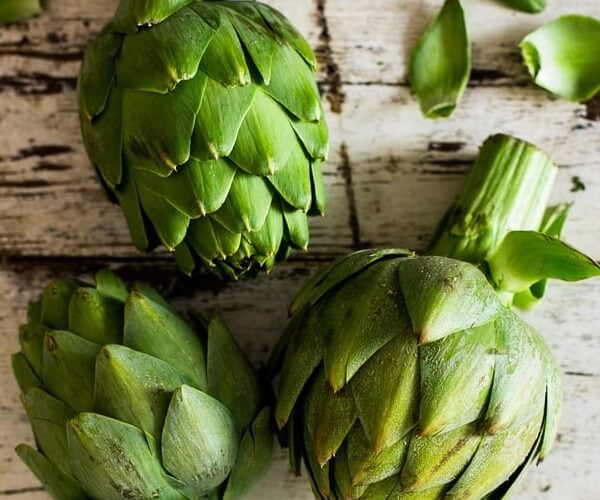
Yes, dogs can have Artichokes in moderation. There are a few reasons why moderation is key which we will discuss below.
While offering your precious pups a small amount of Artichokes can benefit their overall health, there are some dangers we want to bring to your attention first.
By being aware of these dangers, you’ll be able to avoid any surprising medical emergency and bill. And your four-legged friends will be able to enjoy this wonderful vegetable safely. Let’s see what they are.
Are Artichokes bad for dogs?

While this delicious vegetable can provide many health benefits to your furry friends, Artichokes can be bad for dogs in at least three ways.
1. Artichokes can be a choking hazard for dogs
First, Artichokes can be a choking hazard for dogs if they are not prepared properly. You can find whole Artichokes in your local grocery stores. There are also canned Artichokes that contain quarters and halves Artichokes.
If you feed your pooch Artichokes without chopping them into small pieces, then there’s a high risk that they can be a choking hazard. Many dogs don’t chew their food properly and usually swallow their food as soon as you hand it to them.
Due to this, the Artichoke can get lodged in their airway. If your pooch does manage to swallow the large Artichoke pieces, they can get stuck in the intestines as well and cause intestinal and bowel obstruction.
In some cases, these types of obstruction require immediate surgery.
To avoid this, you’ll want to chop the Artichokes into small pieces so it’s easier for your dogs to chew and digest. If the Artichokes are already in quarters and halves, go ahead and chop them down into further small pieces.
Handy Hint: Hard candies such as Caramel candies can also be a choking hazard for dogs. Check out Can Dogs Eat Caramel? to find out if Caramel is safe for doggy consumption.
2. Eating too many Artichokes can have adverse effects on dogs
If owners are not careful, it’s very easy for their furry friends to eat a large serving of Artichokes. When this happens, your pooch may have diarrhea and an upset stomach.
That’s because Artichokes are high in fiber. While a moderate amount of fiber consumption is great for your dog’s digestive system, too much fiber intake can lead to loose and watery stool and all of this can be uncomfortable for your pooch.
Moderation is key. As with any food, too much of it is not a good idea.
3. Canned Artichokes contain ingredients that are dangerous to dogs
Third, canned Artichokes are not safe for doggy consumption. If you’re planning to feed your pooch Artichokes from the can, please don’t.
That’s because canned Artichokes contain Artichokes that have been marinated in oil and contains ingredients that are not canine-friendly such as distilled vinegar, garlic, salt, spices, citric acid, and ascorbic acid to preserve color.
Some canned Artichokes also contain green olives. If the green olives still have pits in them, remove them so your pooch doesn’t accidentally eat them and risk choking on the pit.
Here’s how these ingredients can negatively affect your furry friends:
Canola oil
While canola oil is fine and safe for canine consumption, they’re not the best oil for our furry friends.
Instead, it’s best to use these dog-friendly oils:
- Coconut oil.
- Sunflower oil.
- Olive oil.
- Fish oil.
- Flaxseed oil.
Distilled vinegar
Some dogs do not react well to distilled vinegar. Distilled vinegar or virgin vinegar is one that can be produced from malt, rice, fruit, wine, raisin, beer, kombucha, balsamic and more! This type of vinegar is distilled from ethanol and it has about 5 to 8% acetic acid in the water which is a bit too acidic for some dogs.
As a result, some dogs (especially small dogs) can get gastrointestinal upset from distilled vinegar. Signs and symptoms of gastrointestinal upset include:
- Upset stomach.
- Loose or bloody diarrhea.
- Vomiting.
- Loss of appetite.
- Feeling lethargic.
- Nausea (licking the air or licking their lips frequently).
- Gulping (to combat acid reflux).
For these reasons, if you know your pooch has a sensitive stomach, avoid feeding him or her any food that contains distilled vinegar such as canned Artichokes. Dogs with kidney disease should also avoid vinegar as well.
Dogs that are healthy and do not have sensitive stomachs can enjoy a little bit of vinegar as it can be beneficial to them. That’s because vinegar can help to detox your dog’s internal organs, relieve hot spots and muscle soreness, and improve your dog’s immune system.
If you’re not sure how your dog will react to vinegar or if this is your dog’s first time having it, it’s best to introduce vinegar in a slow and gradual manner. Offer a small amount and see how your dogs react. If they have negative reactions from it, do not feed them any more vinegar.
When it comes to vinegar, we highly recommend unfiltered apple cider vinegar instead. This type of vinegar is the healthiest and safest for dogs.
RELATED: Can Dogs Eat Balsamic Vinegar?
Garlic and Spices
Garlic is extremely toxic to dogs. Avoid feeding your pooch food that has garlic or onion in it. Garlic, whether it is powdered, dried, raw, cooked, or liquid, are all toxic to dogs.
That’s because garlic contains a compound called thiosulfate that is harmful to dogs. When dogs consume garlic, they may have both hemolytic anemia and garlic toxicity.
Signs and symptoms of hemolytic anemia include:
- Muscle weakness.
- Lethargy.
- Dark-colored urine.
- Pale mucous membranes.
- Jaundice (Whites of the eyes, skin, and mucous membranes turn yellow).
- Fast breathing.
Signs and symptoms of garlic poisoning include:
- Loss of appetite.
- Dehydration.
- Gastrointestinal upset: diarrhea, vomiting, abdominal pain.
- Depression.
If you suspect your pooch has garlic poisoning or hemolytic anemia, contact your vet as soon as you can as this requires immediate medical attention.
Watch out for powdered and dried garlic as they contain a higher concentration per weight.
Other spices that are harmful to dogs are:
- Onion (falls in the same allium family as garlic and can cause onion toxicity since it has a compound called N-propyl disulfide which can cause anemia in dogs).
- Nutmeg.
- Cocoa Powder.
Fun Fact: Ginger is a spice that is considered safe for doggy consumption. Check out Can Dogs Eat Ginger? to learn how much ginger your pooch can have and how it benefits your dog’s overall health.
Salt
If we take a look at one of the most popular canned Artichokes, the Kirkland marinated Artichoke hearts from Costco, we find that just two Artichoke hearts contain 110 mg of sodium!
While that is not a lot of salt for us, it’s considered a lot of salt for our canine friends. Keep in mind that our furry friends only need about 0.25g to 1.5g of salt for every 100g of dog food and they may have already received their daily salt intake limit from their regular meal.
Any additional salt intake can put your dog at risk of salt poisoning.
Signs and symptoms of sodium poisoning include:
- Headache.
- Extreme thirst.
- Frequent urination.
- Loss of appetite.
- Vomiting.
- Loose and watery diarrhea.
- Fluid buildup.
- Swollen tongue.
- Convulsions.
- Confusion.
- Lethargy.
- High fever.
- Nausea.
- Walking in circles or loss of balance.
- Fast breathing.
- Upset stomach.
- Muscle weakness and spams.
- Tachycardia or increased heart rate.
If you suspect your dog has sodium poisoning, consult your vet immediately. Timely diagnosis and treatment are crucial to help dogs recover fully from salt poisoning.
Your dog’s vet may administer IV fluid therapy, oxygen, and electrolytes to combat dehydration. He or she may also suggest medication and may require your pooch to stay overnight at the hospital.
Citric acid
Canned Artichokes are marinated in vinegar which means there is citric acid. Dogs that consume citric acid in large quantities may experience central nervous system depression.
The good news is that dogs naturally do not like the taste of citric acid and will avoid food or fruits with citric acid.
Ascorbic acid
The ascorbic acid used in canned Artichoke is to help preserve the color of this vegetable. Do not feed your four-legged friends too many Artichokes from the can since excessive doses of ascorbic acid can cause dogs to have calculi formation in the kidneys, diarrhea, and even anemia.
With this out of the way, you may now be wondering, “Are Artichokes safe for dogs?” And the answer is yes, Artichokes are safe for dogs. In fact, Artichokes are great for dogs in moderation. Let’s find out why next.
Are Artichokes good for dogs?
Yes, Artichokes are good for dogs when they consume this healthy vegetable in moderation. Here’s why.
This heart-healthy vegetable is packed full of antioxidants, folate, fiber, and potassium.
Antioxidants in Artichokes can help prevent cognitive aging and cancer in dogs
The antioxidants found in Artichokes help fight against harmful free radicals and remove them from your dog’s body. Antioxidants help keep your dogs healthy and can prevent cancer.
It also helps to prevent premature aging and boost your dog’s immune system. Your furry friend’s liver may also thank you for the antioxidants found in Artichokes.
Fun Fact: Chestnuts contains 37.2 mg of vitamin C. This means that Chestnuts are packed full of antioxidants. But are they safe for dogs to eat? Check out Can Dogs Eat Chestnuts? to find out!
Folate in Artichokes is responsible for metabolic functions in dogs
Folate is also known as vitamin B9 and it is responsible for red blood cell production and DNA synthesis in dogs.
Fiber in Artichokes promotes a healthy digestive system in dogs
All dogs need their daily fiber intake. Fiber is essential for a healthy digestive system in dogs. It helps maintain the balance of both good and bad bacteria in the gut.
If your pups have diarrhea, feeding them a small amount of Artichokes may help. That’s because fiber helps to absorb excess water and produce formed and firm stool.
With sufficient fiber intake, your dog will have regular and healthy bowel movements. Dogs with colon injury may benefit from fiber as well.
Potassium in Artichokes is an essential mineral that all dogs need
Potassium is both a mineral and an electrolyte so it is highly reactive with water. When it gets dissolved in water, this mineral creates positively charged ions which allows it to carry electrical pulses throughout the dog’s body.
As we can see, potassium is responsible for sending nerve signals, muscle contractions, and regulating fluids.
Are dogs allergic to Artichokes?
Not really, although if the Artichokes are marinated in oil with other seasonings like salt, garlic, vinegar, spices, and citric acid, it can make your dog sick and cause digestive issues.
Dogs and Artichokes
Proper preparation is key before you offer this nutritious vegetable to your canine companion. In this next section, we’ll discuss the different kinds of Artichokes and whether they are safe for doggy consumption.
If you plan on sharing this healthy vegetable with your K9 pals, you’ll definitely want to read this first.
Can dogs eat Artichoke hearts?
Yes, dogs can eat Artichoke hearts in moderation. Before you feed Artichoke hearts to your furry friends, make sure they are plain with no added seasonings on them. It’s best to feed your K9 friends raw Artichokes so that they can receive the maximum amount of nutrients.
Choose Artichokes that are freshly picked and dice them up. Artichoke hearts provide many health benefits to your pooch so consuming a moderate amount is a good idea. As discussed above, Artichoke hearts contain folate, potassium, and antioxidants.
Moderation is key because offering your dog too many Artichoke hearts can actually cause digestive issues in dogs. That’s because they are high in fiber and consuming too much can cause diarrhea in dogs.
Can dogs eat canned Artichokes?
No, dogs should not eat canned Artichokes because they are usually marinated in oil, vinegar, garlic, spices, salt, and citric acid. As mentioned above, garlic is toxic to dogs.
Canned Artichokes also contain high levels of sodium. In just 2 pieces of Artichoke hearts, there is 110 mg of sodium. Too much salt intake can lead to sodium poisoning in dogs.
Additionally, small, dogs and dogs with sensitive stomachs and kidney disease may feel discomfort and pain after eating canned Artichokes since they can be very acidic due to the vinegar, spices, and citric acid.
For these reasons, it’s best not to feed your dogs Artichoke hearts from the can.
You might also like: Can Dogs Eat Cream Of Mushroom Soup? The Creamy Truth!
Can dogs eat jerusalem Artichokes?
Yes, dogs can eat jerusalem Artichokes in moderation. This type of Artichokes is also known as sunchokes. That’s because they are a species of sunflowers and are starchy plants. Feel free to share jerusalem Artichokes with your pooch in moderation as they can benefit your dog’s digestion.
Can dogs eat spinach Artichoke dip?
No, dogs should not eat spinach Artichoke dip. If we take a look at the ingredients in the spinach Artichoke dip, we see that there are:
- Cream cheese.
- Mayonnaise.
- Romano cheese.
- Parmesan cheese.
- Garlic.
- Garlic salt.
- Basil.
- Salt.
- Pepper.
While it’s called spinach Artichoke dip and both spinach and Artichokes are perfectly safe and nutritious for canine consumption, it is the ingredients in this dip that make it harmful to dogs.
We can see that the spinach Artichoke dip is a dairy product and since most dogs are lactose intolerant, they may not be able to properly digest it and may experience flatulence, bloat, and even diarrhea.
Additionally, there’s garlic. We know from above that garlic is toxic to dogs. Then there’s the salt and garlic salt. Too much salt intake can cause sodium poisoning in dogs.
For these reasons, it’s best to avoid feeding your pooch spinach Artichoke dip.
Can dogs eat Artichoke dip?
No, dogs should not eat Artichoke dips because these dips contain cream cheese. Cream cheese is a dairy product and most dogs are lactose intolerant and will not be able to properly digest Artichoke dips.
As a result, they may have digestive issues such as diarrhea.
Can dogs eat Artichoke leaves?
No, dogs should not eat Artichoke leaves. If your pooch accidentally ate the Artichoke leaves, they should be fine, but it’s best to feed him or her the heart of the Artichokes.
So, can dogs eat Artichokes?
You can definitely share Artichokes with your furry pals but make sure you’ve prepared them properly first. You’ll want to chop or dice the Artichokes into small pieces so that it’s easier for your dogs to chew and digest.
If you’re still not sure whether your dog can have Artichokes or have further specific questions about Artichokes and dogs, we highly recommend that you reach out to your dog’s vet.
DISCLAIMER: THIS WEBSITE DOES NOT PROVIDE MEDICAL ADVICE
The information, including but not limited to, text, graphics, images and other material contained on this website are for informational purposes only. No material on this site is intended to be a substitute for professional veterinary advice, diagnosis, or treatment. Always seek the advice of your veterinarian or other qualified health care provider with any questions you may have regarding dietary needs.
Resources:
https://en.wikipedia.org/wiki/Artichoke
https://www.britannica.com/plant/Jerusalem-artichoke

With over five years of specialized experience as an animal writer, my expertise lies in dog nutrition, health, behavior, grooming, and training. I am dedicated to delivering helpful and informative content that caters to the well-being of our furry friends. My primary goal is to empower pet owners with knowledge and ensure our canine companions thrive in health and happiness. In my free time, I love volunteering at local dog rescue centers.
